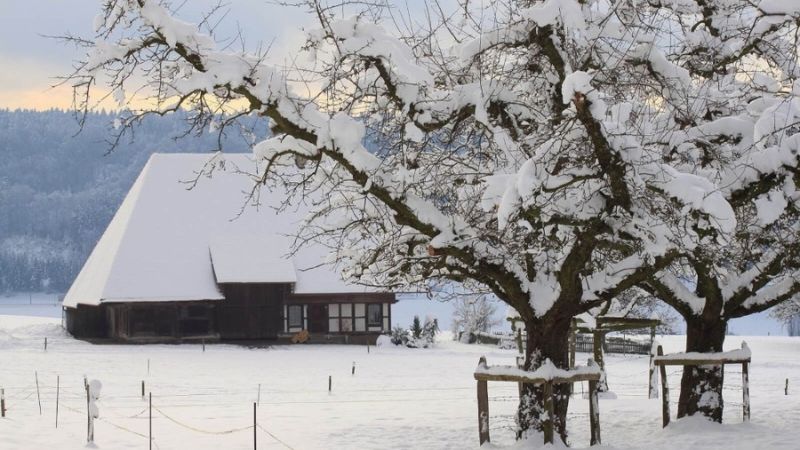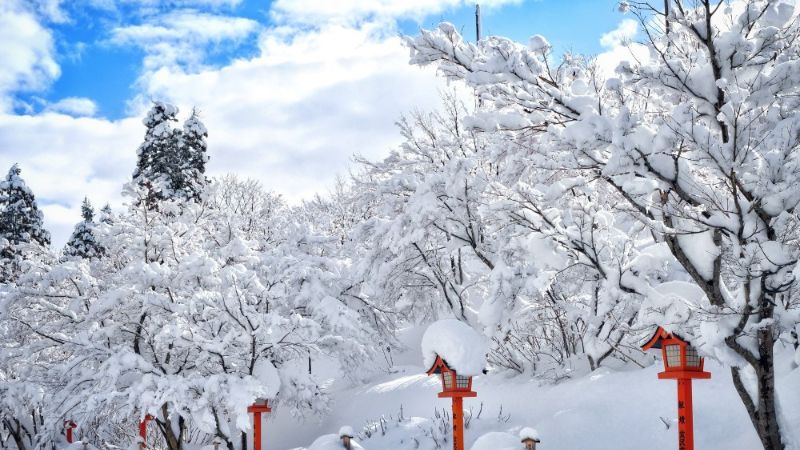The Great Cold is the coldest time of the year and holds significant meaning in terms of feng shui. Let’s explore some fascinating and insightful knowledge about this special day.
1 Understanding the Great Cold
 The Great Cold is the coldest time of the year
The Great Cold is the coldest time of the year
What is the Great Cold?
According to ancient beliefs, there are 24 solar terms in a year, each with unique characteristics that change according to the laws of nature. The Great Cold is the last solar term of the year and marks the coldest period.
Significance of the Great Cold
The Great Cold signifies intense cold, but it is also seen as a time when life begins to regenerate, holding great significance in feng shui.
- Trees such as peach, apricot, and plum start to sprout, and swallows return after the cold, signaling the arrival of spring.
- It is a time of preparation for the Lunar New Year, with bustling business and shopping activities.
- In the Book of Changes, the Great Cold belongs to the Lin hexagram, which symbolizes rebirth, good fortune, and prosperity.
- During the Great Cold, people with Earth as their birth element are believed to encounter many blessings in life, enjoy stable health, and seize opportunities for career and financial success.
- The Great Cold also brings positive energy, making it an auspicious time for major events like weddings, groundbreaking, and house construction.
2 When is the Great Cold in 2022?
 The Great Cold in 2022
The Great Cold in 2022
According to the Lunar Calendar, the Great Cold in 2022 will begin and end as follows:
- Starts on Thursday, January 20, 2022, which is December 18, 2021, in the Lunar Calendar.
- Ends on Thursday, February 3, 2022, which is January 3, 2022, in the Lunar Calendar.
3 Check out the auspicious times for the Great Cold in 2022
 Things to note during the Great Cold
Things to note during the Great Cold
Auspicious and Inauspicious Hours for the Great Cold
Gregorian Dates
| Gregorian Date | Auspicious Hours | Inauspicious Hours |
|---|---|---|
| 20/1/2022 | Zi (23:00-0:59), Chen (3:00-4:59), Mao (5:00-6:59), Wu (11:00-13:59), Wei (13:00-15:59), You (17:00-19:59) | Chou (1:00-2:59), Yin (7:00-9:59), Si (9:00-11:59), Shen (15:00-17:59), Xu (19:00-21:59), Hai (21:00-23:59) |
| 21/1/2022 | Chen (3:00-4:59), Yin (7:00-9:59), Si (9:00-11:59), Shen (15:00-17:59), You (17:00-19:59), Hai (21:00-23:59) | Zi (23:00-0:59), Chou (1:00-2:59), Mao (5:00-6:59), Wu (11:00-13:59), Wei (13:00-15:59), Xu (19:00-21:59) |
| 22/1/2022 | Chou (1:00-2:59), Yin (7:00-9:59), Wu (11:00-13:59), Wei (13:00-15:59), Xu (19:00-21:59), Hai (21:00-23:59) | Zi (23:00-0:59), Chen (3:00-4:59), Mao (5:00-6:59), Si (9:00-11:59), Shen (15:00-17:59), You (17:00-19:59) |
| 23/1/2022 | Zi (23:00-0:59), Chou (1:00-2:59), Mao (5:00-6:59), Wu (11:00-13:59), Shen (15:00-17:59), You (17:00-19:59) | Chen (3:00-4:59), Yin (7:00-9:59), Si (9:00-11:59), Wei (13:00-15:59), Xu (19:00-21:59), Hai (21:00-23:59) |
| 24/1/2022 | Chen (3:00-4:59), Mao (5:00-6:59), Si (9:00-11:59), Shen (15:00-17:59), Xu (19:00-21:59), Hai (21:00-23:59) | Zi (23:00-0:59), Chou (1:00-2:59), Wu (11:00-13:59), Wei (13:00-15:59), You (17:00-19:59) |
| 25/1/2022 | Zi (23:00-0:59), Chou (1:00-2:59), Yin (7:00-9:59), Si (9:00-11:59), Wei (13:00-15:59), Xu (19:00-21:59) | Chen (3:00-4:59), Mao (5:00-6:59), Wu (11:00-13:59), Shen (15:00-17:59), You (17:00-19:59), Hai (21:00-23:59) |
| 26/1/2022 | Zi (23:00-0:59), Chen (3:00-4:59), Mao (5:00-6:59), Wu (11:00-13:59), Wei (13:00-15:59), You (17:00-19:59) | Chou (1:00-2:59), Yin (7:00-9:59), Si (9:00-11:59), Shen (15:00-17:59), Xu (19:00-21:59), Hai (21:00-23:59) |
| 27/1/2022 | Chen (3:00-4:59), Yin (7:00-9:59), Si (9:00-11:59), Shen (15:00-17:59), You (17:00-19:59), Hai (21:00-23:59) | Zi (23:00-0:59), Chou (1:00-2:59), Mao (5:00-6:59), Wu (11:00-13:59), Wei (13:00-15:59), Xu (19:00-21:59) |
| 28/1/2022 | Chou (1:00-2:59), Yin (7:00-9:59), Wu (11:00-13:59), Wei (13:00-15:59), Xu (19:00-21:59), Hai (21:00-23:59) | Zi (23:00-0:59), Chen (3:00-4:59), Mao (5:00-6:59), Si (9:00-11:59), Shen (15:00-17:59), You (17:00-19:59) |
| 29/1/2022 | Zi (23:00-0:59), Chou (1:00-2:59), Mao (5:00-6:59), Wu (11:00-13:59), Shen (15:00-17:59), You (17:00-19:59) | Chen (3:00-4:59), Yin (7:00-9:59), Si (9:00-11:59), Wei (13:00-15:59), Xu (19:00-21:59), Hai (21:00-23:59) |
| 30/1/2022 | Chen (3:00-4:59), Mao (5:00-6:59), Si (9:00-11:59), Shen (15:00-17:59), Xu (19:00-21:59), Hai (21:00-23:59) | Zi (23:00-0:59), Chou (1:00-2:59), Wu (11:00-13:59), Wei (13:00-15:59), You (17:00-19:59) |
| 31/1/2022 | Zi (23:00-0:59), Chou (1:00-2:59), Yin (7:00-9:59), Si (9:00-11:59), Wei (13:00-15:59), Xu (19:00-21:59) | Chen (3:00-4:59), Mao (5:00-6:59), Wu (11:00-13:59), Shen (15:00-17:59), You (17:00-19:59), Hai (21:00-23:59) |
| 1/2/2022 | Zi (23:00-0:59), Chen (3:00-4:59), Mao (5:00-6:59), Wu (11:00-13:59), Wei (13:00-15:59), You (17:00-19:59) | Chou (1:00-2:59), Yin (7:00-9:59), Si (9:00-11:59), Shen (15:00-17:59), Xu (19:00-21:59), Hai (21:00-23:59) |
| 2/2/2022 | Chen (3:00-4:59), Yin (7:00-9:59), Si (9:00-11:59), Shen (15:00-17:59), You (17:00-19:59), Hai (21:00-23:59) | Zi (23:00-0:59), Chou (1:00-2:59), Mao (5:00-6:59), Wu (11:00-13:59), Wei (13:00-15:59), Xu (19:00-21:59) |
| 3/2/2022 | Chou (1:00-2:59), Yin (7:00-9:59), Wu (11:00-13:59), Wei (13:00-15:59), Xu (19:00-21:59), Hai (21:00-23:59) | Zi (23:00-0:59), Chen (3:00-4:59), Mao (5:00-6:59), Si (9:00-11:59), Shen (15:00-17:59), You (17:00-19:59) |
Auspicious Times for Traveling on the Great Cold
The Origin and Meaning of Lunar New Year: Exploring the Celebration
The vibrant and joyous celebration of Lunar New Year is a festival steeped in tradition and held dearly by the Vietnamese people. This article will explain to you the rich history and symbolism behind this important event – Tet!






































